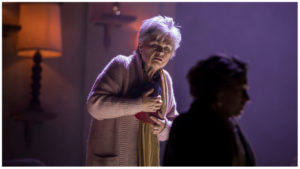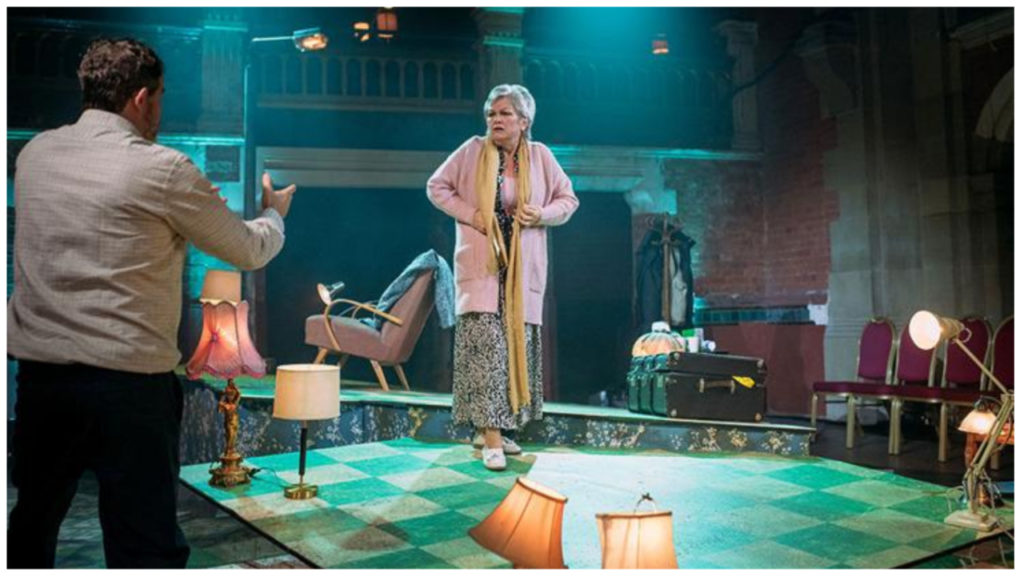
Atlanta Opera 2022-23 Review: Bluebeard’s Castle
Michael Mayes & Susan Bullock Shine in ‘Opera With a Conscience’
By Afton WootenCredit: Raftermen / Mihaela Bodlovic for Theatre of Sound/KSU
The Atlanta Opera staged a powerful production of Daisy Evans and Stephen Higgins’ interpretation of Bartók’s “Bluebeard’s Castle,” bringing to light the heartbreaking truth of people living with dementia and their caregivers. In this new production, instead of a collector of wives, Duke Bluebeard is the loving husband of his one and only wife, Judith. A trunk containing the treasures and memories of their life together represented Bluebeard’s locked doors. As each memory is unlocked, the audience and Judith share the experience of witnessing her at various stages of her life. Instead of secrecy, Bluebeard tries his best to protect his wife, and himself, from reliving sadness.
During the talk-back, dementia specialist Mary Joyce Ramos educated the audience about helpful and unhelpful practices when working with those with this disease. Ramos encouraged the audience not to correct or remind someone of reality but to show grace and love, which, as we see in this opera, is easier said than done. Ramos added that caregivers should not compare the person they are aiding to the person they used to know. That being said, comparing this production to Bartók’s original is unnecessary. They are different stories but with the same glorious music.
Changes in Perception
Even before the opera officially began, the audience was drawn into the mind of someone with dementia using visuals. The successful collaboration between Evans’ stage direction, Adrian Linford’s scene designs and costumes, and the extravagant lighting by Jake Wiltshire exhibited Judith’s puzzle-like reality.
The interworkings of Judith’s mind and her past selves were represented using the four levels of the stage. Each layer is uneven, staggered, and painted, showing different decades of Bluebeard and Judith’s lives. The wall of lamps (not pictured) and lights scattered throughout the space flickered as memories and emotions stirred.
On the surface, it may have seemed like Bluebeard and Judith were frantically moving around the stage as if to catch or escape one another, but there was more to it. The first level, or ground level, is where the two live when there are glimpses of reality and understanding. In a heartbreaking scene where Judith remembers the death of their son, Bluebeard and Judith meet downstage, center, focusing on their son’s things and both reliving the tragedy together.
On the other stage levels, there was confusion and disconnect. Each level is an encounter in which Judith meets earlier versions of herself and tries to remember and understand what was before her.

Mirrors
As Judith, Susan Bullock’s performance was exquisite. While the visual cues from the staging were beneficial, Bullock did not need the aid. Her subtle expressions and mannerisms were spot on.
The same goes for the other Judiths played by Eva Lukkonen (1960s Judith), Marissa Romanoff (1980s Judith), and Mary Beth Morrison (1990s Judith). Each mastered Judith’s personality and gave their all to this challenging role.
Each Judith played off the others, letting us get to know her. Lukkonen’s vibrant, youthful energy shows the Judith with whom Bluebeard fell in love. Then we see her in different stages of motherhood. Romanoff (1980s) was warm and caring without saying or singing a word. The modern-day Judith reflected this as the two Judiths took turns holding the baby and teddy bear. They shared the same motherly love, despite the inevitable changes.
In Morrison’s scene as the 1990s Judith, she and the modern-day incarnation mirrored each other just as previous versions did. This time, the lamps constantly flickered, and the mirroring scene lasted longer, as if this encounter sparked a memory for modern Judith. Remembering her family, modern-day Judith moved downstage to examine this version of her life.
Light in Darkness
Michael Mayes, as Duke Bluebeard, expressed unconditional love and realness throughout his entire performance. His lush tone variety and flawless register shifts were magnificent. Mayes brought a lightness to Bluebeard as he cared for his sick wife but did not shy away from the bitter truth of being a caregiver. He let loose and expressed the frustration of his sorrowful monotony.
The timeline of the encounters is left to interpretation—this could be the first time Bluebeard and Judith have gone through this process, or it could be the hundredth time. Both Mayes and Bullock alluded to that element well.
Higgins’ chamber reduction of the original large scoring was perfect for this setting. It matched the intimacy of the staging and the tender interpretation of the story. Each section came through, even via the live stream, as did the droning and the chromatic motifs.
The impetus and dedication of this production were outstanding. As Michael Mayes said, “it’s an opera with a conscience.”


